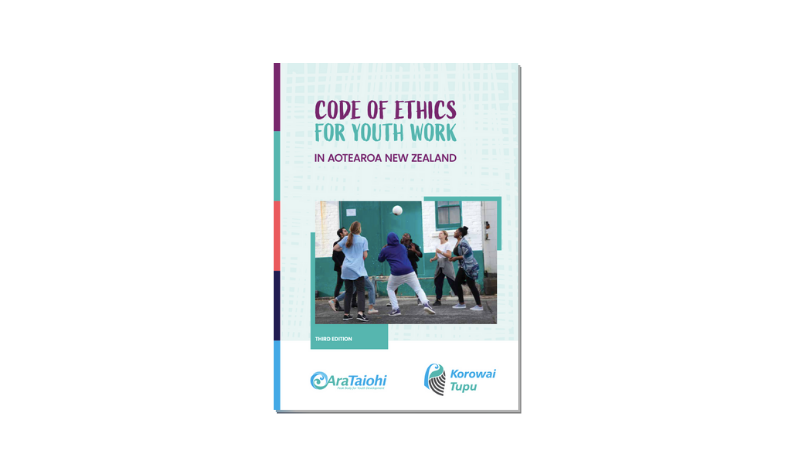THE CODE OF ETHICS
Young People Working With Young People Scenarios |
He tauira
Experiences* of Young People working with Young People
Experiences* of Young People working with Young People
“I had just begun a new placement with an all-girls group. I am a young male youth worker. I know that gender is no longer the sole determinate of who is best to work with who (assuming sexuality is narrow and out of date). However, in this case I very quickly realised it was not an exactly ideal group to be a part of, and gender was a key factor in this. We put in place enough measures to ensure that both the young people and I were safe, and the programme proceeded as normal with no hiccups.
Weeks went by and the group was running the course as normal, when one day one of the girls in the group made a comment regarding the nature of the relationship between me and the lead facilitator outside of the group. This, in turn, made me feel quite uncomfortable, to the point where I found myself making excuses to get out of being a part of the programme. The girl had also disclosed to the lead facilitator that she had a ‘crush’ on me, which added to my discomfort. This became an inside joke during my placement, but my team was now more attentive to possible risks and put in place more safety measures for both me and the young person. As the year progressed, we slowly got a rise in the number of male students coming along to the programme, which decreased my discomfort and
allowed me to return to the group.”
Personal Reflections: Some key learnings I have taken away from this experience was how I can better conduct myself in that situation. Setting up clear boundaries from the start about my role and limitations was a conversation I should have had from the start with my manager and team. When things became uncomfortable, I needed to find better strategies to approach the situation rather than just abruptly leaving the group, which created a sense of disruption and confusion within.
Self-care was a massive wake-up call in this case, as I was already at my limits in terms of workload and my personal life. This reflected in my practice, which then limited the young people’s experience of the programme. In the future, I would apply some of the steps above, as well as having those courageous conversations with the people who have the ability to support me better in my practice.
“In my experience of working with young people, consistency has always proven to be very important when wanting engagement and in building strong working relationships. As a young youth worker you are generally provided with additional support, whether through management or support people that help aid in your work. I had been a part of a group that required additional support people; they helped to advise us through decision making processes, planning and events etc.
We ran a specific event annually. It was very engaging and a different way for us to connect with young people. We planned to continue to run this event. However, our support people thought that by running this event we weren’t targeting the age group that our team catered for and we were told we couldn’t run this event anymore. Members of the team were quite discouraged by this decision as we felt they didn’t really take any of our input on board given we made it clear we wanted to keep the event as is. The result was that we were made to change the event entirely.
Months later in a separate meeting, another outside advisor for the group suggested that we expand more with our projects in terms of who we engage with. They gave the idea to do projects or events with those who don’t necessarily fit within our targeted age range. This caused a lot of confusion for our team as we’d previously been criticized for doing exactly as suggested, yet our support people approved the idea once it came from another advisor. This highlighted huge inconsistency in the way they worked with us. Members felt as though their voices were undervalued and taken out of decision-making processes as a whole.“
Personal Reflections: Some key learning I have taken away from this experience was to hold people more accountable to what they say and do, especially in spaces that effect young people. Young people in general have the most influential voices and people forget this. It is important to ensure that anyone who comes into these spaces is here for the benefit of young people. Young people’s voices have so much power and therefore should be used. I’ve learnt to ask more questions and not be afraid in doing so even if it’s months later.
Asking for outside help is something I think a lot of us forget we can do. Usually in these situations we tend to try and go with the flow as we don’t want to create any conflict but in doing so the issues continue and nothing changes. It is always ok to ask for help. Lastly, I’ve learnt that I should never let anyone undervalue my voice. If I were to be in a similar situation again, I would ensure to bring up the concerns straight away or as soon as possible and collectively try to resolve them.
*Scenarios are based on a true stories. Details were changed to protect privacy.
NextWhakaaro from Young Youth Workers
Our behaviour is guided by our ethics and our ethics are based in our values.
The Code of Ethics provides an agreed set of guidelines for youth work in Aotearoa to ensure that youth work is carried out in a safe, skilled, ethical manner.